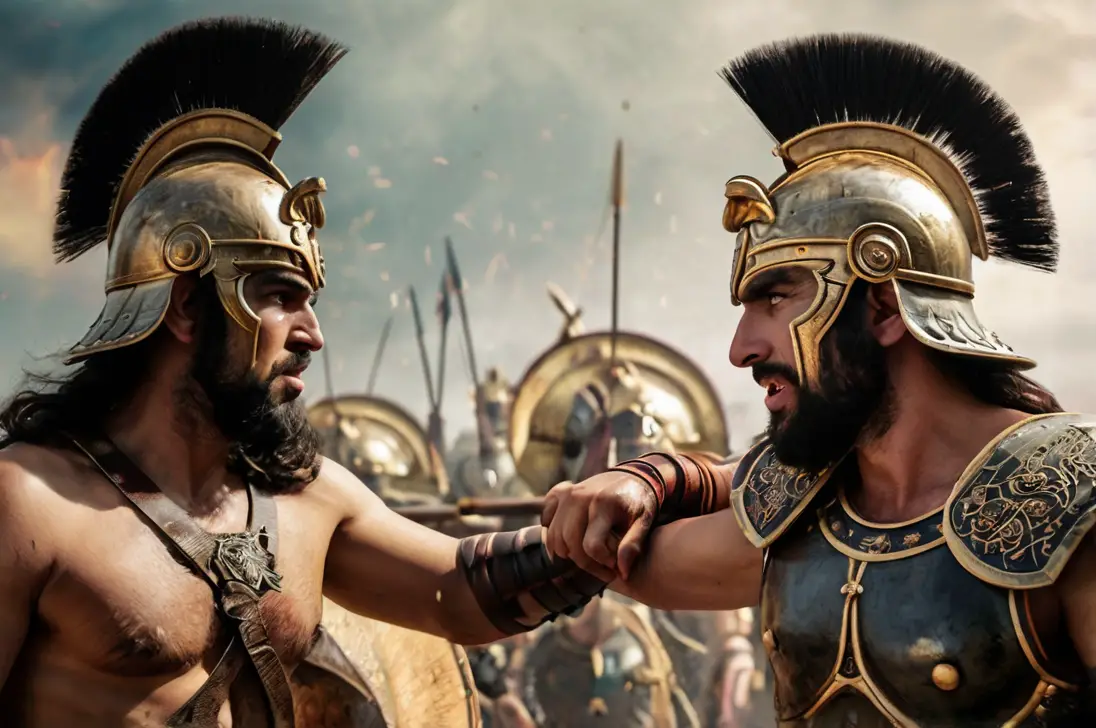
The Trojan War is one of the most famous conflicts from ancient times, celebrated in Greek mythology and epic poetry.
This legendary war, fought between the city of Troy and the Greek states, has fascinated people for centuries.
In this blog post, we’ll explore the timeline of the Trojan War, starting with the events that set the stage, moving through the dramatic battles, and uncovering the clever strategies that led to Troy’s downfall.
Join us on a journey through this iconic story to discover the key moments of the Trojan War.
Pre-War Events
The Judgement of Paris
The origins of the Trojan War can be traced back to a seemingly simple event—the wedding of Peleus and Thetis.
At this celebration, Eris, the goddess of discord, was not invited.
Feeling slighted, she threw a golden apple into the midst of the festivities with the inscription “To the fairest.”
This apple sparked a dispute among the goddesses Hera, Athena, and Aphrodite, who all claimed it for themselves.
To settle the disagreement, the goddesses turned to Paris, a prince of Troy, to decide who deserved the apple.
Each goddess offered him a tempting reward: Hera promised power, Athena promised wisdom, and Aphrodite promised the love of the most beautiful woman in the world.
Paris chose Aphrodite, which set off a chain of events leading to the abduction of Helen.
- Read also: Narcissus in Greek Mythology – The Myth of the Self-Absorbed Youth
- Read also: Perses in Greek Mythology: Unraveling the Forgotten Titan
The abduction of Helen
Paris, guided by Aphrodite, traveled to Sparta, where he met Helen, who was known for her unparalleled beauty and was married to Menelaus, the king of Sparta.
Paris and Helen fell in love, and she left Menelaus to be with him in Troy.
This act was seen as a huge insult to Menelaus and Greece, as Helen’s departure was considered both a betrayal and an affront to Greek honor.
The gathering of the Greeks
Angry and determined to get Helen back, Menelaus turned to his brother Agamemnon, the king of Mycenae.
Agamemnon agreed to help and took on the task of rallying the Greek states.
He gathered many of the greatest Greek heroes of the time, including Achilles, Odysseus, and Ajax.
Together, they assembled a powerful fleet and army.
Their mission was clear: to set sail for Troy, wage war, and reclaim Helen.

The War at Troy
The Aulis stalemate
Before the Greek fleet could set sail for Troy, they faced a significant delay at Aulis.
The goddess Artemis, angered by the Greeks, caused unfavorable winds that prevented their departure.
To appease Artemis and gain her favor, Agamemnon, the Greek leader, was forced to make a heart-wrenching decision: he had to sacrifice his daughter Iphigenia.
This tragic sacrifice allowed the Greek ships to finally sail to Troy, but it also planted the seeds of future conflict and sorrow within the Greek camp.
The arrival and significance of Achilles
Achilles, the greatest warrior of the Greeks, arrived at Troy with a prophecy hanging over him.
It was foretold that he would achieve great glory in the war but would also die young.
Despite this ominous prediction, Achilles’ presence was vital for the Greeks.
His exceptional skills in battle made him an essential asset, and his fate and actions would become central to the unfolding drama of the war.
His heroic feats and personal struggles shaped much of the conflict and story of the Trojan War.
Early battles and Patroclus’ death
The early stages of the Trojan War were filled with intense battles and personal duels, such as the notable fight between Paris and Menelaus.
However, the war took a dramatic turn with the death of Patroclus, Achilles’ close friend and companion.
Patroclus, dressed in Achilles’ armor to boost the morale of the Greek troops, entered the battlefield. Unfortunately, he was killed by Hector, the Trojan prince.
This loss deeply affected Achilles and set the stage for his dramatic return to the battlefield, marking a crucial turning point in the war.

The Turning Point: The Rage of Achilles
Achilles’ wrath and withdrawal
Achilles was devastated by the death of Patroclus and swore to avenge him.
His wrath was directed towards Hector and the Trojans, but before he could act, he withdrew from battle, mourning his friend’s loss.
His absence crippled the Greek forces, giving the Trojans a temporary advantage.
The intervention of Patroclus
Patroclus’ death was a turning point in the war. His bravery and sacrifice galvanized Achilles, who resolved to return to battle.
Donning new armor forged by the god Hephaestus, Achilles re-entered the fray with a vengeance, determined to kill Hector and turn the tide of the war.
Deception and Victory
The cunning plan of Odysseus
As the Trojan War dragged on with no decisive end in sight, Odysseus, renowned for his cleverness, came up with a brilliant strategy to break the stalemate.
The Greeks built a massive wooden horse and hid a group of their best soldiers inside it.
They then left the horse at the gates of Troy and pretended to retreat, sailing away from the city.
To complete the ruse, they left behind a single Greek soldier, who pretended to be a deserter and claimed that the horse was a peace offering.
The fall of Troy
Believing the Greeks had finally given up and left, the Trojans brought the wooden horse into their city as a symbol of victory.
That night, as the city slept, the Greek soldiers hidden inside the horse quietly emerged.
They opened the city gates, allowing the rest of the Greek army—who had secretly returned under cover of darkness—to enter Troy.
With the city now open, the Greeks launched a surprise attack, sacking Troy and leading to its complete destruction.
This clever deception by Odysseus marked the end of the war and the fall of the great city of Troy.

Aftermath and Consequences
The journey home
Even after the fall of Troy, the Greek heroes faced many challenges on their way back home.
Their journeys were far from smooth and were filled with dangers and difficulties.
For instance, Odysseus had an especially rough trip, taking him ten long years to return.
His adventures, detailed in Homer’s “Odyssey,” were filled with encounters with mythical creatures, gods, and other obstacles.
These trials made his return journey legendary and highlighted the challenges of their return from the great war.
The legacy of the Trojan War
The Trojan War had a profound impact on Greek mythology and literature.
It inspired some of the most famous epic poems ever written, including Homer’s “Iliad” and “Odyssey.”
The stories from the war, full of heroism, betrayal, love, and loss, have continued to captivate and influence people through the centuries.
These tales have left a lasting imprint on art, literature, and culture, shaping how we think about heroism and tragedy even today.

- Read also: A Glimpse into History: The Ancient Greek Civilization Timeline
- Read also: Greek Gods vs Roman Gods: Exploring the Divine Duel
Conclusion
The Trojan War is more than just a myth; it’s a timeless tale of human emotion, heroism, and tragedy.
From the judgment of Paris to the fall of Troy, the events of this legendary conflict have shaped the course of history and literature.
By understanding the timeline and key events of the Trojan War, we gain insight into the enduring power of these ancient stories.



